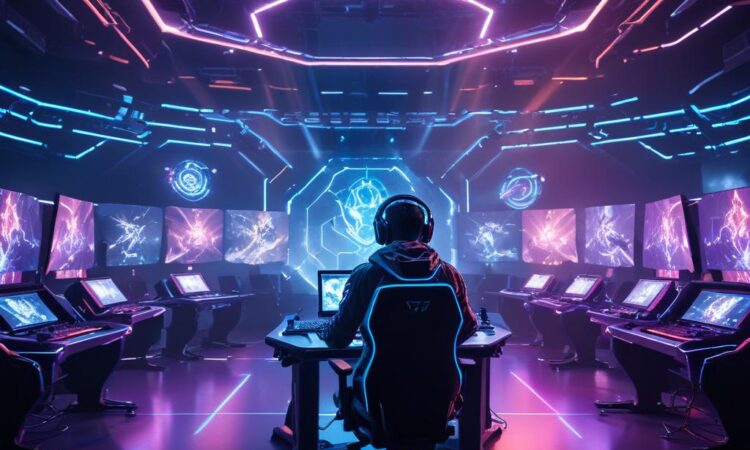Impact of AI in Esports: The Rise of Artificial Intelligence
The world of esports has witnessed a remarkable transformation in recent years, with the advent of artificial intelligence (AI) ushering in a new era of innovation and efficiency. From coaching and player analysis to game development and even the very act of playing, AI is rapidly infiltrating every facet of the esports landscape, revolutionizing the way the industry operates and the way fans experience the thrill of competition.
AI in Esports Coaching
One of the most impactful areas where AI is making its mark is esports coaching. Coaches, once reliant on their intuition and experience, now have powerful AI tools at their disposal to enhance their strategies and optimize player performance. AI-powered coaching platforms can analyze massive datasets of gameplay footage, identifying patterns, weaknesses, and areas for improvement. This data-driven approach allows coaches to create personalized training plans, tailor strategies to individual player strengths, and optimize team compositions for specific game modes.
For example, AI can analyze a player’s in-game decision-making, identifying tendencies and providing feedback on how to improve their positioning, timing, and overall game sense. It can even create virtual opponents that mimic the playstyles of real players, providing valuable training experiences that simulate real-world competition. By leveraging these AI-powered tools, coaches can gain a deeper understanding of their players, identify blind spots, and help them reach their full potential.
AI in Player Analysis
Beyond coaching, AI is also playing a crucial role in player analysis. Esports organizations are increasingly relying on AI to gather insights into player performance, identify emerging talent, and track the evolution of the competitive landscape. AI algorithms can analyze vast amounts of data from live matches, tournaments, and even practice sessions, extracting valuable information that can be used to inform player selection, team building, and overall strategic decision-making.
For example, AI can analyze individual player statistics, track their performance over time, and identify key metrics that indicate their strengths and weaknesses. This data can be used to create player profiles, compare their performance to other players, and even predict their future success. By leveraging AI-powered analysis, organizations can make more informed decisions about roster changes, talent acquisition, and overall team development.
AI in Game Development
The impact of AI extends beyond the realm of coaching and player analysis, reaching into the very core of game development itself. Game developers are increasingly using AI to create more immersive, engaging, and challenging gameplay experiences. From procedural level generation to non-player character (NPC) behavior, AI is revolutionizing the way games are designed and developed.
For example, AI can be used to generate complex and varied game levels, ensuring that each playthrough offers a unique and engaging experience. AI can also power realistic and dynamic NPC behavior, making them more responsive, unpredictable, and challenging opponents. This level of sophistication adds a new dimension to gameplay, making the experience more immersive and rewarding.
AI in Gameplay: The Future of Esports
While AI is currently being used to enhance coaching, analysis, and game development, the ultimate frontier lies in the realm of gameplay itself. The idea of AI players competing against humans, or even replacing human players altogether, is no longer a distant sci-fi fantasy but a rapidly approaching reality. The development of increasingly sophisticated AI algorithms has led to the creation of virtual players that can exhibit impressive skill and strategic prowess, rivaling and even surpassing human counterparts in certain aspects of gameplay.
While the ethical and practical implications of AI players in esports are still being debated, the technological advancements are undeniable. The potential for AI to revolutionize the esports landscape is vast, opening up new possibilities for competitive gameplay, fan engagement, and the overall evolution of the industry. As AI technology continues to advance, it is likely to play an even more significant role in shaping the future of esports, blurring the lines between human and machine and redefining the very nature of competitive gaming.
The use of AI in esports presents both opportunities and challenges. While AI can significantly enhance the experience for players, coaches, and fans, there are concerns about the potential for bias, job displacement, and the erosion of the human element in esports. It is crucial to approach the development and implementation of AI in esports responsibly, ensuring that it enhances the competitive landscape while maintaining the core values and principles of the industry.
As AI technology continues to evolve, the esports industry will need to adapt and embrace the transformative power of this groundbreaking innovation. By leveraging AI responsibly and strategically, esports can reach new heights of competition, engagement, and innovation, ushering in a new era of exciting possibilities for players, fans, and the industry as a whole.
Conclusion
The impact of AI on esports is undeniable, reshaping the industry in profound ways. From coaching and player analysis to game development and even gameplay itself, AI is transforming how esports operates, how players compete, and how fans experience the thrill of competition. While the future of AI in esports is filled with exciting possibilities, it is crucial to approach this emerging technology with careful consideration and a commitment to ethical and responsible development, ensuring that the human element remains at the heart of this dynamic and evolving industry.

